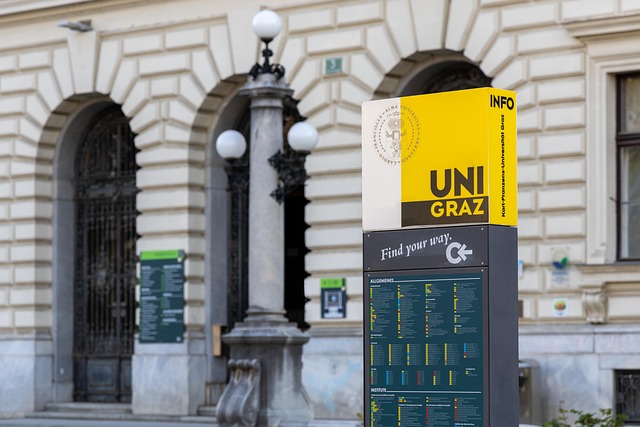Trusted Translations: Navigating University Regulations with Precision
TL;DR:Clear, accurate translations of university regulations and policies are crucial for global higher education, avoiding misunderstandings, legal issues, and enhancing inclusivity. Translators must navigate specialized academic language and cultur…….

TL;DR:
Clear, accurate translations of university regulations and policies are crucial for global higher education, avoiding misunderstandings, legal issues, and enhancing inclusivity. Translators must navigate specialized academic language and cultural differences while maintaining legal accuracy and formal tone. Quality assurance strategies include employing experts, standardizing methods, peer reviews, advanced machine translation, and regular updates to ensure compliance and accessibility for all students. Partnering with specialists, creating style guides, and using human-reviewed tools are best practices for implementing reliable University Regulations and Policies translations.
Trusted translations of university regulations and policies are paramount for international students and faculty navigating complex academic environments. This article delves into the critical importance of accurate translations in higher education, highlighting challenges like nuanced language and cultural contexts that can create common issues. We explore strategies to ensure quality and consistency, offering best practices for universities to implement trusted translation services, fostering inclusive and accessible learning communities globally.
- Understanding the Importance of Accurate Translations in Higher Education
- Challenges and Common Issues in Translating University Documents
- Strategies for Ensuring Quality and Consistency in Policy Translations
- Best Practices for Implementing Trusted Translation Services at Universities
Understanding the Importance of Accurate Translations in Higher Education
In the diverse landscape of higher education, where students and faculty members come from all corners of the globe, clear communication is paramount. Accurate translations of university regulations and policies play a crucial role in ensuring every individual understands their rights, responsibilities, and expectations. When documents are not properly translated, it can lead to misinterpretations, confusion, and potential legal issues, undermining the overall educational experience.
An unreliable translation might present itself as a mere inconvenience but can, in reality, have significant implications. Students might inadvertently violate academic integrity rules or fail to meet essential administrative requirements due to a language barrier. Conversely, accurate translations foster inclusivity and accessibility, empowering all members of the university community to navigate their academic journey with confidence and compliance.
Challenges and Common Issues in Translating University Documents
When translating university regulations and policies, several unique challenges emerge due to the specialized nature of academic language and institutional nuances. One significant issue is maintaining legal accuracy while bridging different linguistic and cultural frameworks. University documents often contain complex terminology and specific references that may not have direct equivalents in other languages. Translators must possess a deep understanding of both the source and target languages to convey precise meanings, ensuring compliance with local laws and regulations.
Additionally, keeping tone and style consistent across translated versions is crucial. Academic policies are typically formal and structured, requiring translators to maintain this integrity while adapting content for global accessibility. Common pitfalls include oversimplification or misinterpretation of nuanced concepts, resulting in potential confusion among international students, faculty, or administrators. Therefore, meticulous attention to detail, cultural sensitivity, and subject matter expertise are paramount in addressing these challenges effectively.
Strategies for Ensuring Quality and Consistency in Policy Translations
Maintaining quality and consistency in translating university regulations and policies is paramount to ensure clarity and compliance for all stakeholders. A robust strategy involves employing professional translators with deep knowledge of both the source language and academic terminology. Standardization of translation methodology, including term databases and style guides, helps preserve terminology accuracy and consistency across documents.
Additionally, implementing a peer review process where multiple translators check each other’s work enhances precision. Regular training sessions on university-specific policies and updates in relevant fields further improves the team’s expertise. Leveraging advanced machine translation tools can aid in efficiency, but human oversight remains crucial to catch nuances lost in automated translations, thereby guaranteeing that the final product adheres strictly to University Regulations and Policies.
Best Practices for Implementing Trusted Translation Services at Universities
Implementing trusted translation services for university regulations and policies is a strategic move to ensure clarity and accessibility for a diverse student body. Here are some best practices to consider. First, partner with reputable translation companies that specialize in academic documentation. These experts should have a deep understanding of legal terminology and cultural nuances across various languages. Standardization is key; create a consistent translation style guide to maintain coherence throughout all documents.
Secondly, employ machine translation tools as a preliminary step but always follow up with human review. This hybrid approach leverages technology’s speed while ensuring accuracy and context. Additionally, offer translated materials alongside the original documents for reference. Regularly update translations to reflect changes in university policies, fostering a dynamic and responsive system that keeps students informed through reliable, trusted translations of university regulations and policies.
University regulations and policies are essential documents that shape the academic experience. Accurate translations of these texts are vital to ensure inclusivity and accessibility for international students and faculty. By understanding the challenges, adopting quality control strategies, and implementing best practices, universities can provide trusted translations that uphold the integrity of their policies. This approach fosters a welcoming environment, supports effective communication, and promotes equality within higher education institutions worldwide.






